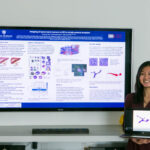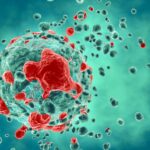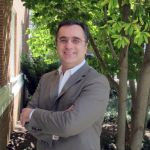Student Research Spotlight Mikaela Mallin

Interview by Amy Weldon
Mikaela Mallin is a second year PhD candidate in the Johns Hopkins Cellular and Molecular Medicine program, studying under Ken Pienta, professor of urology at Johns Hopkins Medicine, director of research at The James Buchanan Brady Urological Institute, and co-primary investigator at the Physical Sciences-Oncology Center. She is a team member within the JHU PS-OC studying poly aneuploid cancer cells (PACCs), a rare and special subtype of cancer cell. Though PACCs have long been observed in prostate cancer research, they have typically been ignored or discounted as scientifically artifactual. However, new findings indicate that PACCs may actually play an important natural role in the disease’s progression.
Q: What is the focus of your thesis?
MM: It’s still early, but I am studying the migratory potential of PACCs in prostate cancer. Prostate cancer becomes a lethal and incurable disease when the cancer metastasizes, or spreads from initial tumor site to multiple sites around the body. I want to see if PACCs can move further or faster throughout a patient’s body than normal cancer cells. If so, treatments could be designed to target these mobile PACCs to reduce the number of metastatic events that prostate cancer patients experience.
Q: Explain the Pienta lab’s perspective on PACC migration and behavior?
MM: We like to think about prostate cancer using ecological paradigms. For instance, the tumor lives in a micro-environment (just like the environment that surrounds humans), which is comprised of many species that are constantly interacting. In this case, each different type of cell within the tumor micro-environment represents a different “species” and, like any ecosystem, these species compete for resources. Similar to lions, hyenas, and wild dogs competing for prey, access to shelter, or water on the African grasslands, the different cancer cells in the tumor are competing for resources like oxygen, glucose, and growth factors.
Additionally, if resources are scarce in one area, animals will leave to find resources elsewhere. The species who do this most frequently or effectively are typically the best at surviving. It’s this same principle, called the optimal foraging theory, that the Pienta Lab uses to understand how and why cells within the tumor micro-environment may migrate away from the primary tumor and spread to other parts of the body. We believe the PACC “species” is able to migrate the most efficiently whenever they need to search to find new resources. We hypothesize that this phenomenon could be the driving force behind metastasis.
Q: How has COVID-19 and the stay-at-home order changed your approach to your research?
MM: When we got sent home in March, I spent a couple of months diving deep into prostate cancer literature. This was something all new graduate students need to do, so the timing worked in my favor. It was during this time that I familiarized myself with what is going on in the field and identified some key questions relating to metastasis that could serve as thesis questions.
Q: Have there been other pros and cons?
MM: Many members of the team are from all over the world and chose to ride out the pandemic (and continue their studying) in their home countries. In some ways it’s made the lab easier to manage because there are fewer folks in and out, but it’s a little bit sad too. It’s nice when we have everyone together.
Q: What was your original motivation for studying prostate cancer?
MM: Like most people, I have family members who suffered from cancer, so that’s definitely a key reason I’m interested in studying the disease. Additionally, I’m excited by the prospect of contributing to the huge library of knowledge about cancer that was built by scientists before me, and I love knowing that my work will do the same for scientists who come after me.
Q: What does your work mean to you?
MM: Our lab’s mission is to reduce the morbidity and mortality of prostate cancer, and I think that is an extremely noble and worthy reason to come into the lab every day. Additionally, I personally look forward to participating in the ongoing scientific process so that future generations of researchers can build on the conclusions from my research. This iterative cycle is what constantly fuels scientific advancement and generates lifesaving therapies. Participating in this legacy of discovery is exciting and I’m honored to be a part of it.
Latest Posts
-
 Q&A with PSON Intern Jocelyn Hsu
August 19, 2021
Q&A with PSON Intern Jocelyn Hsu
August 19, 2021
-
 Start Up Founders from Johns Hopkins Aim to Stop Spread of Cancer
August 3, 2021
Start Up Founders from Johns Hopkins Aim to Stop Spread of Cancer
August 3, 2021
-
 Protein Appears to Prevent Tumor Cells from Spreading Via Blood Vessels
July 15, 2021
Protein Appears to Prevent Tumor Cells from Spreading Via Blood Vessels
July 15, 2021


